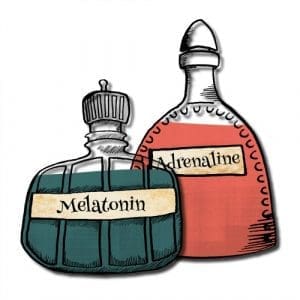Sometimes young people can get tarred with the same old brush. They’re lazy, loud, don’t listen, or sleep in too late! But one of the main reasons they are different is because…. well that’s just it, they ARE different. Their brain chemistry isn’t like that of babies, toddlers, or adults because their brains and bodies are growing, developing and learning every day.
If we can understand this as parents, it can really help us on our parenting journey. It can also help if we understand ourselves and our own history. Learning how to understand each other can help us have better relationships at home, and, where needed, help us to avoid conflict.
That’s why the Cyrenains’ Scottish Centre for Conflict Resolution (SCCR) have been working on ways to help everyone understand how our brain works and how what is going on in our mind and body can have a big impact on our relationships.
Their new digital resource – the Emotional Homunculus – helps us understand how our past experiences mould how we act and react to situations, and how all our emotional states (for example, Fight or Flight, Rest and Digest) and the way we act and react come from a selection of powerful chemicals in the Brains Amazing Drugs Cabinet.
The aim is to give parents, young people (and professionals) an understanding of how what’s happening inside us (and what happened in our past!) can dictate how we act and react to situations, particularly when it comes to arguments – and to pass on some Top Tips on how to maintain the best balance between the chemicals in our brain!
The SCCR have developed a brilliant resource at https://scottishconflictresolution.org.uk/homunculus, with a host of information to help understand brain chemistry – important information that can be used to nurture healthy relationships and strong connections with the children and teens in our lives.
The SCCR have picked out three of the most common drugs below, and shared some of the best top tips on helping both parents and young people keep them in balance to create the most harmonious home-life possible.
1. Melatonin (the Brain’s Marvellous Sleep Drug)
 Melatonin helps control everyone’s sleeping and waking cycles depending on habit, daylight and seasons. But teenager brains produce Melatonin later in the day (sometimes two hours later than the average child or adult) which means they stay up longer, plus there’s still Melatonin in their blood steams in the morning (hence the desire to sleep in). As we get older Melatonin is released earlier in the evening, which may be why as parents we feel like falling asleep in front of the television. It also explains why adults tend to wake up earlier.
Melatonin helps control everyone’s sleeping and waking cycles depending on habit, daylight and seasons. But teenager brains produce Melatonin later in the day (sometimes two hours later than the average child or adult) which means they stay up longer, plus there’s still Melatonin in their blood steams in the morning (hence the desire to sleep in). As we get older Melatonin is released earlier in the evening, which may be why as parents we feel like falling asleep in front of the television. It also explains why adults tend to wake up earlier.
Top Tips
- As parents consider whether having an argument about sleeping in late when it’s a chemically induced state is worth it – instead maybe think about discussing Melatonin and how your teenagers brain is different to open up ways you can solve the problem together, for example, establishing that good sleep routine, earlier nights before school/exam, or even letting them sleep in on days where there’s no need to get up.
- Getting a good night’s sleep is vital for growing teenage bodies and minds – so encouraging teenagers to go to bed and switch off screens at a fixed time each night will help a good sleep routine, improve memory, mood and immune systems.
- Parents can also do with a good sleep routine, so instead of pushing yourself to get through everything and then falling asleep on the couch, think about a new routine, maybe some gentle stretching, or a bath and a good book. It’ll help your body to rest properly.
2. Dopamine (the Brain’s Deluxe Joy Drug)
Dopamine creates a feeling of euphoria and heightens our sense of making experiences more pleasurable. It plays a big part in the state of ‘Rest and Digest’.
Teenagers seem to get more excited about things but that’s because their levels of Dopamine are less regulated than adults and flow easily through their brains and bodies. Hence them taking risks or quickly feeling like they are on top of the world from certain experiences. Part of our biological development involves the brain’s ability to learn when to release Dopamine and how much each situation needs. Teenagers need to have experiences to learn what’s safe and unsafe, which actions bring rewards, and which bring reprimands (not just from parents/carers but also friends and society).
Top Tips
- Too much Dopamine in teenagers can cause risk-taking behaviour or cause them to put themselves in harm’s way. Talk to your teenager about ways they can take a step back from situations if they feel like things are getting a bit out of hand. Help them to think about how they can take a moment to think about what is happening and make a call about continuing, or getting out of a situation?
- Work on ways to increase your dopamine – when we’re ‘Alert and Engaged’ we’re able to concentrate better and see the bigger picture. Dopamine also increases the effects of other drugs in the Brain’s Amazing Drugs Cabinet.
3. Adrenaline (the Brain’s Amazing Action Drug)
Adrenaline is one over which our conscious mind has the least control throughout our lifetime; after all we need Adrenaline to jump out of harm’s way even before our thinking brains have realised the danger is there. Adrenaline is the fastest acting chemical and can last in the bloodstream for up to an hour after its first triggered.
It plays a huge part in the states of ‘Alert and Engaged’ keeping us ready to act – but also in ‘Anxious and Afraid’ by keeping our senses selective and looking for trouble. So it can be a tricky customer to manage!
While young people’s brains and bodies are still developing. Adrenaline is triggered as easily and stays in the bloodstream for as long as fully-grown adults, so the effects can feel overwhelming. The other important thing to remember is that your body doesn’t know the difference between Adrenaline being triggered by a false alarm or real danger. So, if you’re not using the Adrenaline to run away from real danger then that drug can stay in your body and turn into aggressive behaviour or irritability.
Top Tips
- Having conversations about this at home is helpful. Talking about the role that Adrenaline has to play in anger (at a time when everyone is calm) is really useful. Reminding ourselves that Adrenaline is our brain and body’s way of protecting us and that aggression can sometimes be a side-effect of too much left-over Adrenaline is a useful starting point.
- One good way to rid yourself of excessive Adrenaline – both as a teenager and as a parent – is to exercise.
- Teenagers watch out! Online games are not a way to relax. These games are designed to keep your Adrenaline levels at trigger point so you’ll feel as irritable and agitated as when you stop.
- To avoid Adrenaline overwhelming your system, practice some mindful breathing. Exhale, and notice the breath as it flows in and out.
- Take a step back when you feel your Adrenaline levels starting to rise. If you can try to take the other person’s perspective or shift yours.
Discover more at https://scottishconflictresolution.org.uk/homunculus.
Please join SCCR on social media @sccrcentre on Facebook and Twitter to share what you think of the new resources, and your own #toptips on how to avoid arguments at home, using the hashtag #cranialcocktail.
Image Credit: Hannah Foley


I have a 20 year old step son that has only had one job and kept it for only a month has never worked and Wife has to apply for jobs for him he has no intention of getting a job, he is not a self starter lazy sleeps all day and up at night on Xbox wife serves him and treats him like a baby, she has to even apply and get applications for him then has to fill out applications it’s driving me nuts
This is fabulous information! It makes me understand my 12 1/2 year old son more. Thanks!
Hi Deirdre,
We (at the Scottish Centre for Conflict Resolution) are delighted to be able to work with Hey Sigmund to share the message about how brain chemistry can affect our relationships – especially in the teenage years.
Do visit the project website for more of the Brain’s Amazing Drugs
https://scottishconflictresolution.org.uk/homunculus or why not take a fun quiz and discover what type of brain you have Monkey or Lizard https://scottishconflictresolution.org.uk/brain/monkeyvslizard
or what Act you would be in the Circus of Life! https://scottishconflictresolution.org.uk/brain/keeptheheid
Please get in touch if you’d like any further information on any other related topics!
best regards,
The SCCR Team
An enlightening article particularly as a parent of a teenager!
Hi George,
Thanks for your comment!
We (at the Scottish Centre for Conflict Resolution) are delighted to be able to work with Hey Sigmund to share the message about how brain chemistry can affect our relationships – especially in the teenage years.
Do visit the project website for more of the Brain’s Amazing Drugs
https://scottishconflictresolution.org.uk/homunculus or why not take a fun quiz and discover what type of brain you have Monkey or Lizard https://scottishconflictresolution.org.uk/brain/monkeyvslizard
or what Act you would be in the Circus of Life! https://scottishconflictresolution.org.uk/brain/keeptheheid
Please get in touch if you’d like any further information on any other related topics!
best regards,
The SCCR Team
Awesome as always!
Hi Michelle,
We (at the Scottish Centre for Conflict Resolution) are delighted to be able to work with Hey Sigmund to share the message about how brain chemistry can affect our relationships – especially in the teenage years.
Do visit the project website for more of the Brain’s Amazing Drugs
https://scottishconflictresolution.org.uk/homunculus or why not take a fun quiz and discover what type of brain you have Monkey or Lizard https://scottishconflictresolution.org.uk/brain/monkeyvslizard
or what Act you would be in the Circus of Life! https://scottishconflictresolution.org.uk/brain/keeptheheid
Please get in touch if you’d like any further information on any other related topics!
best regards,
The SCCR Team
I have four children all very individuals and only one mother me and the reading about teens and children of this age is extremely helpful to myself as a Mammy to open conversations like this with my children, something a little bit interesting and helpful too , a kind of fun in a different way and ways of my child also learning about herself, marvellous
Dear Lisa,
We (at the Scottish Centre for Conflict Resolution) are so happy that you found the article useful and enjoyed sharing the ideas with your children.
If you’d like to initiate further discussions with them then do visit the project website for more of the Brain’s Amazing Drugs
https://scottishconflictresolution.org.uk/homunculus or why not take a fun quiz and discover what type of brain each of you has Monkey or Lizard https://scottishconflictresolution.org.uk/brain/monkeyvslizard
or what Act you would be in the Circus of Life! https://scottishconflictresolution.org.uk/brain/keeptheheid
Please get in touch if you’d like any further information on any other related topics!
best regards,
The SCCR Team